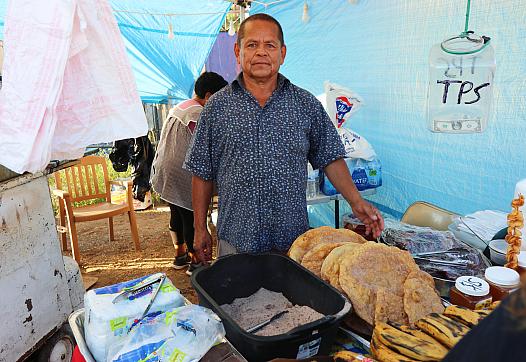‘We Did It!’ Street Vendors Across L.A. County Celebrate a Hard-Fought Victory
This story was originally published in Capital & Main with support from the 2022 California Fellowship.
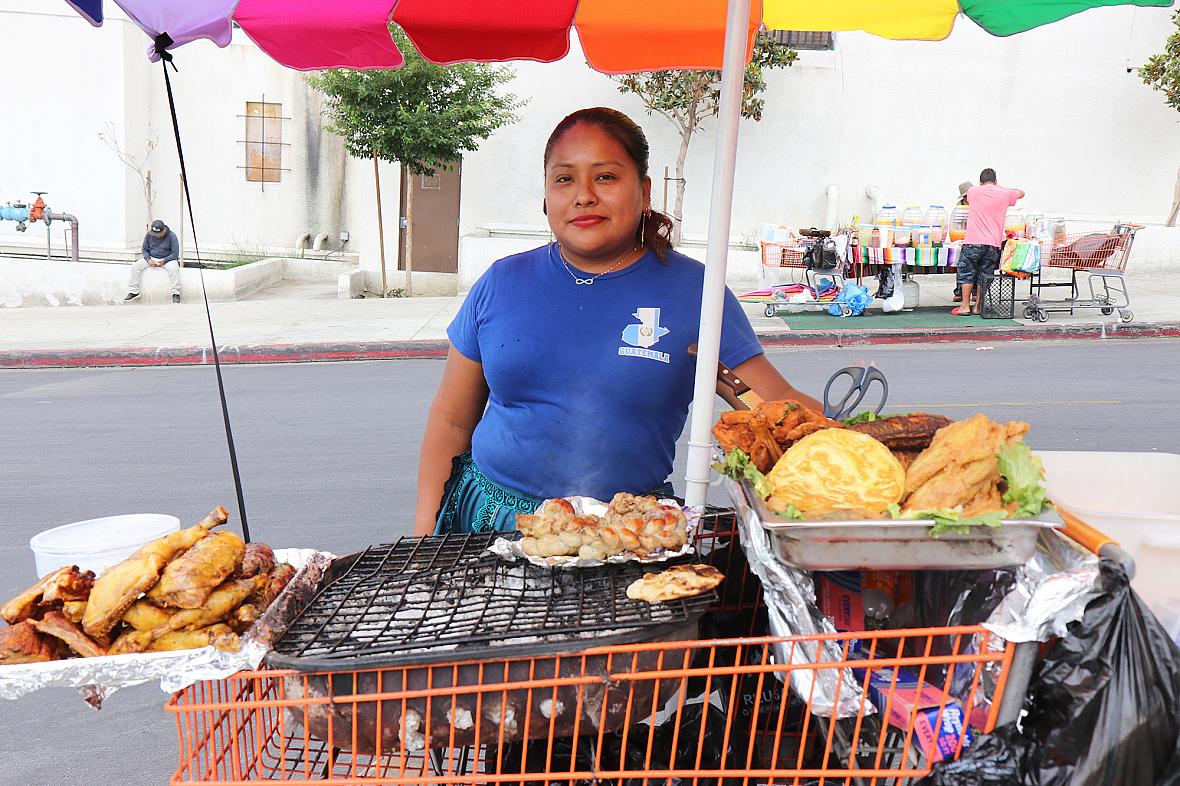
Carolina stands behind a homemade food cart at the Guatemalan Night Market in the Westlake neighborhood of Los Angeles.
All photos by Janette Villafana.
It was standing room only in Mariachi Plaza on Sept. 30 as more than 200 street vendors wept and embraced each other while they celebrated the passage of SB 972 with music, dancers and food cooked by vendors from across Los Angeles.
Typically, it’s vendors’ umbrellas that paint Los Angeles sidewalks like rainbows, but that night it was vendors’ shirts that filled the Boyle Heights square with color, each announcing the street or market its wearer hailed from. Vendors from the Piñata District, the Fashion District, the Guatemalan Night Market in MacArthur Park, Leimert Park, Hollywood Boulevard and more were enjoying each other’s food. Some had just come straight from Sacramento, where they successfully lobbied for the passage of the bill.
“Lo hicimos!” vendors cried as the crowd cheered. “We did it!”
SB 972 will update the California Retail Food Code to help street food vendors get their public health permits, and will go into effect on Jan. 1. Currently, the state Health and Safety Code makes it nearly impossible for vendors to obtain permits, while city and county agencies frequently fine unpermitted vendors or throw out their food and equipment. Police departments still arrest them when inspections escalate.
It’s nothing new: in Los Angeles, vending criminalization dates back to at least 1892, when city officials first tried to ban “tamale wagons.” Between 2010 and 2019, the police department arrested more than 4,300 people for illegal sidewalk vending, the department revealed in a 2019 record request. In 2013 alone, more than 1,100 people were arrested for “illegal sidewalk sales.”
“Very few movements in the United States change policy in the first try, and we’ve done it twice in four years.”
~ Sergio Jimenez, organizer, Community Power Collective
Without an overhaul of the health code, legalization would always be “unfinished business,” as the legal aid group Public Counsel wrote in a major report on the issue. But now that SB 972 has passed, is the long history of criminalization really over?
“Not that long ago, I was almost arrested for selling ice cream,” one vendor at Mariachi Plaza told L.A. TACO. “A police officer even pulled a gun on me. This puts a stop to that type of treatment. This treatment will hopefully just be a thing of the past now.”
“Very few movements in the United States change policy in the first try, and we’ve done it twice in four years,” says Sergio Jimenez, who organizes street vendors with the Community Power Collective. “That should highlight the potent force that vending is. It’s traditional, power-building organizing that did this.”
But Rudy Espinoza, executive director of Inclusive Action for the City, which helped pass SB 972, won’t allow himself to be too optimistic.
“I’m really excited that this passed, but I’m also not foolish enough to think this is the end,” he says. “This is not a silver bullet.”
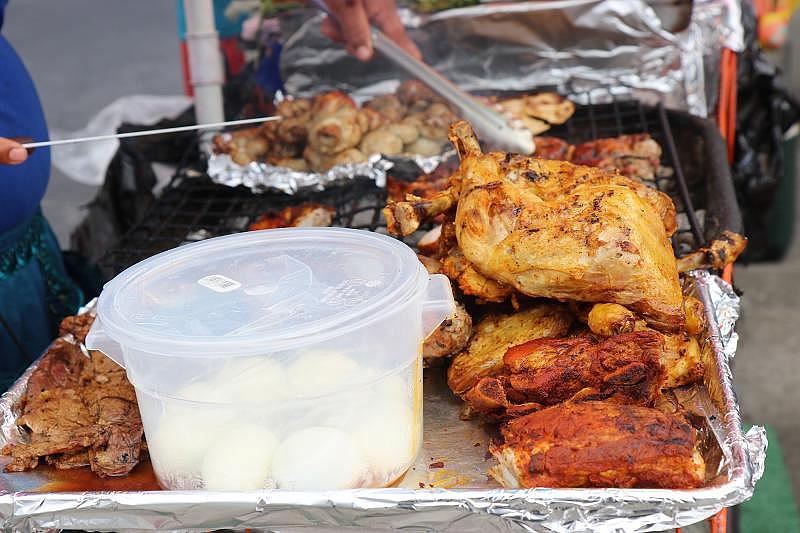
Chicken, loaded with sazón, cooks on the grill at the Guatemalan Night Market near MacArthur Park.
California tried to decriminalize street vending in 2018 with SB 946, which made an administrative citation, rather than an arrest, the maximum penalty for unpermitted vending.
Cities rushed to establish permitting programs, hastily setting training requirements and fees for the business certificates and health permits vendors would need, while chalking off “no vending zones” in the most touristy areas.
But when those programs opened, vendors found they could not meet the new state health code, which required vendors who cooked to have three-compartment sinks, significant refrigeration and trash space.
Vendors found that legalization had transformed criminalization, not banished it. Though SB 946 prevented governments from issuing misdemeanors for unpermitted street vending, violating the health code remained a misdemeanor, which during Donald Trump’s presidency could result in deportations of undocumented vendors. SB 972 makes violation of the food code an administrative citation, effective immediately.
In L.A. County, health inspectors have thrown out unpermitted vendors’ food and equipment in addition to issuing misdemeanor citations.
The L.A. County Department of Public Health (DPH) threw away the food of 39 vendors in May and June of 2021 alone, according to records obtained by Capital & Main. Since Jan 1, 2020, the Los Angeles Bureau of Street Services has issued more than 3,100 tickets for selling food and merchandise, says Paul Gomez, a spokesperson for the bureau.
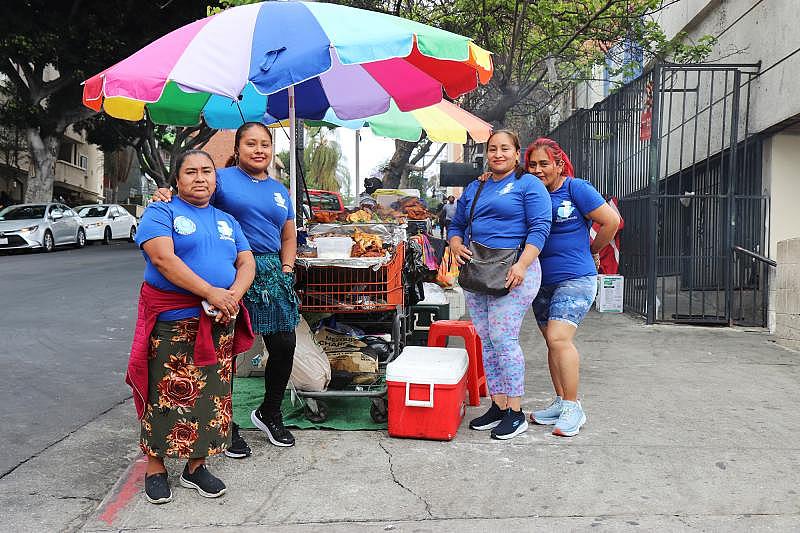
Women form the majority of vendors at the Guatemalan Night Market.
An estimated 10,000 vendors sell food in Los Angeles, but just 240 permits have been issued, Gomez says, since L.A. began issuing them in 2020.
Meanwhile, vendors have been testifying to the stress they work under. In mental health surveys of more than 20 street vendors conducted by Capital & Main and L.A. TACO, more than 75% of vendors said they were traumatized by relentless policing. All said the raids were devastating financially.
“We’re no stranger to enforcement,” says Euralia Chavez, a mother to three girls who has sold tamales for 16 years at the Guatemalan Night Market in Los Angeles’ MacArthur Park neighborhood. Chavez has been cited eight times by DPH. But she says that enforcement was worse before decriminalization in 2019.
“The police would chase us,” she says. “Years ago, I got a ticket for $1,977.77.”
The shock of the fine is still present in Chavez’s voice as the smell of smoky, grilled chicken fills the intersection at Sixth Street and Bonnie Brae. The majority of vendors at the Guatemalan Night Market are single mothers who utilize their sazón (flavor) to make a living.
“With my tamal sales, two of my older daughters have been able to study,” says Chavez, with a smile on her face. One daughter studies biology, while the older one is following her mother’s example and studying business.
SB 972 removes the most burdensome requirements for vendors reheating precooked foods, like the water heater and the three-compartment sink, while making it easier for them to cook off-site. It also lets vendors cook with a food handler’s permit rather than a food manager’s certificate, swapping a multiday process for an online test. Vendors will still need three compartment sinks and more to cook raw meat, fish or poultry at their carts.
“I have my permit to sell, but that sometimes doesn’t even matter because they won’t let you sell where you want.”
~ Dulce Sanchez, street vendor
To ensure vendors get their permits, city and county agencies need to conduct aggressive outreach, offer financial aid and halt enforcement, says Lyric Kelkar, policy director at Inclusive Action for the City. The permitting process is still expensive and complicated, and vendors will need help from public health departments to enroll. Street vending permits cost $291 while county health permits cost $393 annually for vendors selling “low risk” food like ice cream or fruit to $772 per year for “high risk” food like tacos. Cart inspections cost $746.
“A key focus of ours now is making sure that the L.A. County Department of Public Health implements this properly,” says Rudy Espinoza. “We’ve always advocated for them to prioritize education. We’re going to continue to do that even more.”
DPH is developing “outreach materials” to educate vendors on the changes to the health code and how they can get permits, a spokesperson for the department wrote in a statement. The DPH will also educate cart manufacturers on compliant designs and the cart approval process.
“For unpermitted sidewalk food vendors preparing raw meat, poultry, or fish, Public Health will continue to enforce the food code due to the potential for food borne illness,” the DPH spokesperson wrote.
But an ongoing dispute between police and street vendors at the Santa Monica Pier is a warning that vending legalization will probably not end vending criminalization.
In the most lucrative locations for street vending — tourist destinations and retail corridors — vendors say it doesn’t matter if they have permits: Businesses want them out, and cities follow their orders.
“I have my permit to sell, but that sometimes doesn’t even matter because they won’t let you sell where you want,” says vendor Dulce Sanchez, dwarfed by a cart of peluches (stuffed animals) that she sells to Palisades Park visitors. “I have been chased from the boardwalk to the train tracks two times, and they have arrested me in the past too.”
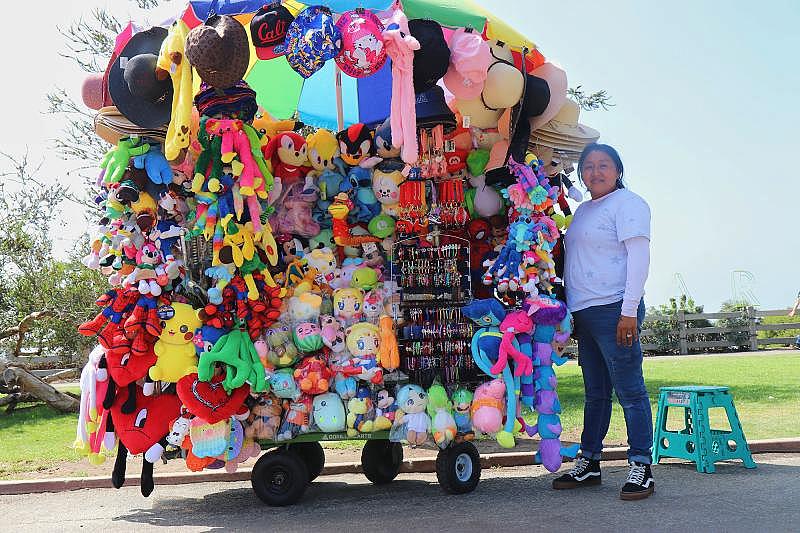
Dulce Sanchez sells peluches, stuffed animals, at Palisades Park in Santa Monica
While SB 972 won unprecedented support from the Los Angeles Chamber of Commerce, tourism groups lobbied against the legislation.
The Santa Monica Pier and the California Attractions and Parks Association opposed SB 972, as did Fisherman’s Wharf, Pier 39 in San Francisco and the Santa Cruz Beach Boardwalk.
Tourist destinations are the most profitable places for vendors to work, and they’re often declared “no vending zones” by city governments. There are seven no vending zones in Los Angeles, all surrounding tourist destinations like Universal Studios or Dodger Stadium, and in Santa Monica, vending on the pier is aggressively policed. But for many vendors, the rewards of a large clientele outweigh the risks of heightened policing.
On Jan. 28, 2022, more than a dozen street vendors who sell on or near the Santa Monica Pier accused the city of racially profiling them following a string of sweeps conducted by a special street vending enforcement task force created by the city of Santa Monica in 2022. The unit is a collaborative effort between the Santa Monica Police Department and four other city departments, including the Santa Monica City Attorney’s Office. SMPD officers also join the Los Angeles County Department of Public Health on vending inspections in Santa Monica. According to Lt. Erika Aklufi of the SMPD, the task force recently expanded to target crime generally in the downtown Santa Monica area.
Pier and beach visitors have filmed officers from the task force handcuffing street vendors. In one video, vendors cling to their fruit and hot dog carts and plead with cops not to take their property away. In July of this year, Santa Monica vendors filed a civil rights lawsuit against the city for the targeted towing of their cars and confiscating equipment when vendors are not present. The National Lawyers’ Guild accused Santa Monica of violating due process law in a report on the city’s vending enforcement.
Vendors wonder if Santa Monica’s aggressive policing is meant to protect brick and mortar businesses on the pier from market competition.
“Approximately” 13 vendors with “license agreements” with Santa Monica can sell their goods on the pier, according to the city website.
Vendors accuse officers of using excessive force in sweeps and arrests.
One officer “hit my 12-year-old daughter with his baton,” says Israel Fernando Hernandez. “They can arrest you for anything, even if it has nothing to do with street vending. They find a way.”
Jorge Luis Cruz, owner of Del Mar Fruits, has worked the pier for 20 years. Task force cops, like the “very aggressive” officer Steven Hollowell, torment vendors, he says.
In March of this year, when Hollowell and other SMPD officers arrested a vendor on the pier, the vendor’s son fled at the sight of the cops, according to Christian Contreras, her lawyer.
The vendor pleaded with officers to locate her son or let her go so she could find him, according to clips from Hollowell’s body camera footage that were posted on TikTok by her lawyer. “I just want to know where my kid is,” she told him. Pier visitors demanded she be released.
“We’ll add another charge for general neglect,” Hollowell said. “She’s doing a drama show for everybody.”
Hollowell did not reply to a request for comment, and city of Santa Monica Communications and Public Information Manager Constance Farrell also declined to comment on Hollowell.
A hot dog vendor says Hollowell shoved her against her truck with his bike so she was “squeezed like ham between two bricks” against the car, according to a draft of a federal lawsuit she is filing against Hollowell and the city of Santa Monica. Her lawyer, Christian Contreras, requested anonymity for the vendor until the lawsuit is filed.
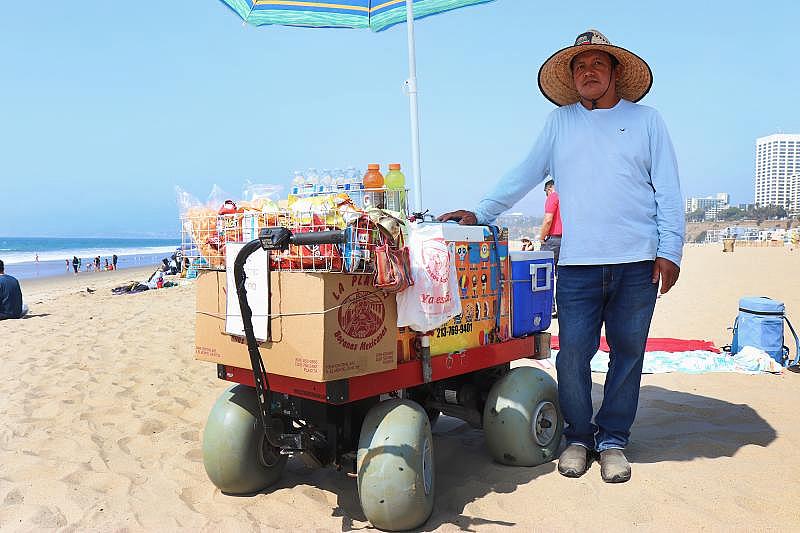
Delfino Caranza sells ice cream, chips and beverages from a makeshift beach cart in Santa Monica.
Vendors wonder if Santa Monica’s aggressive policing is meant to protect brick and mortar businesses on the pier from market competition. On Oct. 28, representatives from the city of Santa Monica, the police department and its code enforcement unit denied arresting vendors at the behest of pier businesses.
“We’re aware of the narrative,” Deputy City Manager Anuj Gupta said. “If it were the case that the city were interested in protecting brick and mortar interests and their profits, we wouldn’t have issued 200 sidewalk vending permits.”
On the pier, vendors’ use of combustibles is a fire risk, Gupta said, and vendors clog evacuation routes at pier entrances.
However, vendors like Dulce Sanchez say they have been arrested and ticketed by SMPD officers even though they weren’t selling at the pier or using combustibles. Sanchez was swept out of Palisades Park, adjacent to the pier.
Though buoyed by the passage of SB 972, pier vendors believe that permits will do little to change the dynamics behind many decades of criminalization.
Still, Rudy Espinoza says the SB 972 campaign was revolutionary in itself because vendors flexed newfound political power, traveling successfully to the state Capitol to lobby for their bill.
“The vendors going to Sacramento, folks realizing that they have power — I think all that flies in the face of the history of this state,” he says. “This campaign shows a different way, and I hope it’s just the beginning.”
All photos by Janette Villafana.
The story is part of a series reported with support from the USC Annenberg Center for Health Journalism 2022 California Fellowship program, with engagement support from the center’s interim engagement editor, Monica Vaughan.



